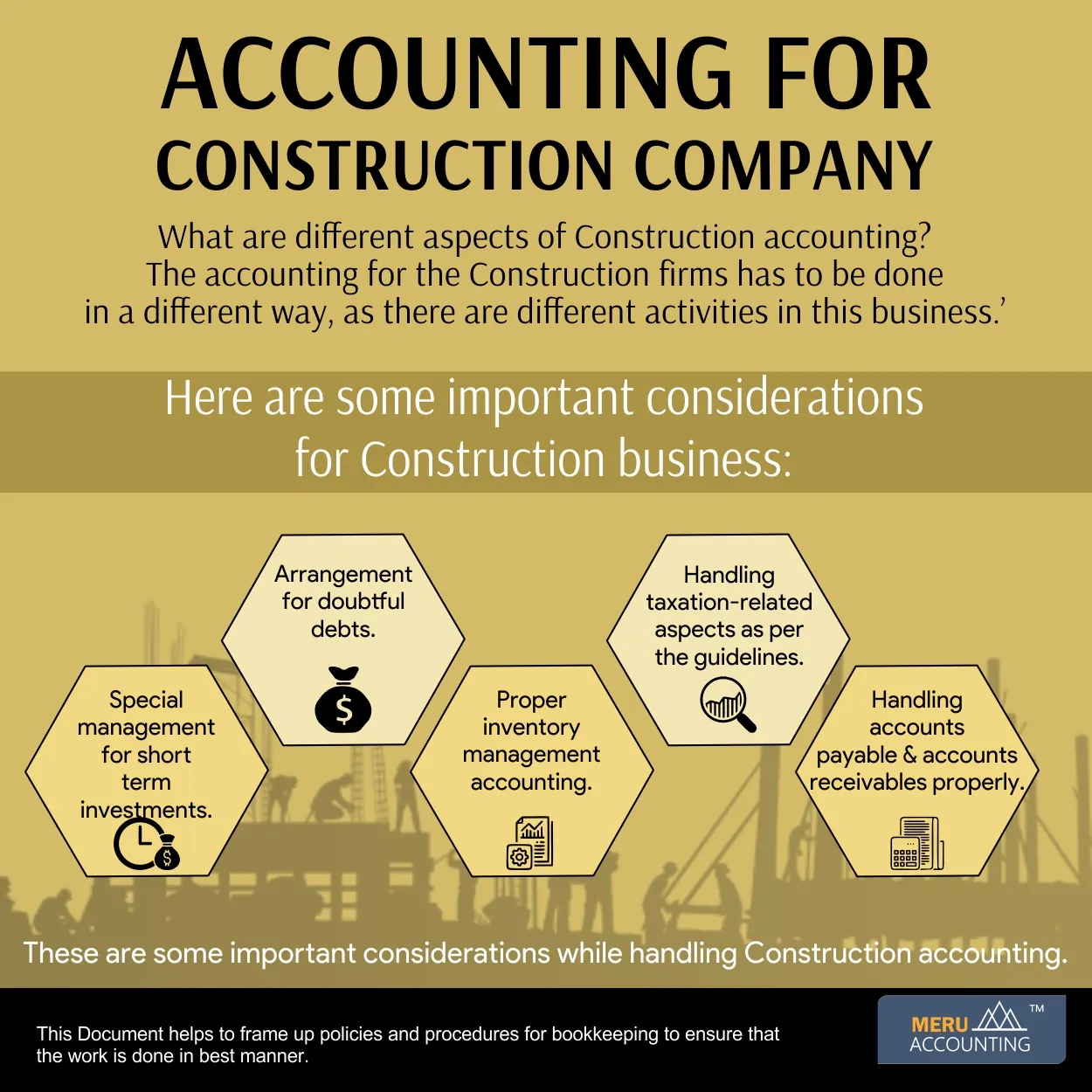Things about Pvm Accounting
Things about Pvm Accounting
Blog Article
What Does Pvm Accounting Do?
Table of ContentsPvm Accounting Fundamentals ExplainedIndicators on Pvm Accounting You Need To KnowFacts About Pvm Accounting UncoveredThe Facts About Pvm Accounting Revealed9 Easy Facts About Pvm Accounting ExplainedThe Basic Principles Of Pvm Accounting Things about Pvm AccountingThe smart Trick of Pvm Accounting That Nobody is Talking About
One of the main factors for implementing bookkeeping in building jobs is the requirement for monetary control and administration. Building jobs commonly need significant financial investments in labor, materials, devices, and other resources. Proper bookkeeping allows stakeholders to keep an eye on and manage these financial resources successfully. Audit systems offer real-time insights right into task prices, income, and earnings, enabling job managers to without delay determine prospective issues and take restorative activities.
Accountancy systems allow firms to keep track of cash circulations in real-time, ensuring enough funds are offered to cover expenditures and meet monetary commitments. Effective capital administration aids protect against liquidity crises and keeps the job on course. https://linktr.ee/pvmaccount1ng. Building tasks undergo various monetary mandates and coverage needs. Appropriate bookkeeping makes certain that all economic transactions are tape-recorded precisely which the task follows accountancy standards and contractual arrangements.
Not known Factual Statements About Pvm Accounting
This reduces waste and enhances project performance. To much better recognize the significance of audit in building and construction, it's also necessary to compare building administration bookkeeping and project management bookkeeping. mainly concentrates on the economic facets of the building business as a whole. It manages total financial control, budgeting, capital monitoring, and monetary coverage for the whole organization.
It focuses on the monetary aspects of private construction projects, such as price estimation, expense control, budgeting, and cash circulation administration for a particular task. Both kinds of audit are necessary, and they complement each other. Building and construction monitoring accountancy makes certain the firm's financial wellness, while job management audit makes certain the financial success of specific tasks.
The Buzz on Pvm Accounting

A crucial thinker is called for, that will collaborate with others to choose within their areas of responsibility and to boost upon the locations' work processes. The position will certainly connect with state, college controller team, university departmental staff, and scholastic researchers. He or she is expected to be self-directed once the first learning contour relapses.
What Does Pvm Accounting Do?
A Construction Accountant is in charge of taking care of the financial facets of building and construction jobs, consisting of budgeting, cost monitoring, economic coverage, and compliance with regulative needs. They function closely with job supervisors, specialists, and stakeholders to make certain exact monetary documents, price controls, and timely repayments. Their competence in building accounting principles, project costing, and monetary analysis is crucial for effective monetary management within the construction sector.

9 Easy Facts About Pvm Accounting Explained
Pay-roll tax obligations are taxes on a worker's gross salary. The revenues from pay-roll tax obligations are made use of to fund public programs; as such, the funds collected go straight to those programs rather of the Internal Income Service (IRS).
Note that there is an added 0.9% tax for high-income earnersmarried taxpayers that make over $250,000 or single taxpayers making over $200,000. Earnings from this tax go toward federal and state joblessness funds to assist employees who have actually lost their jobs.
Pvm Accounting Can Be Fun For Anyone
Your down payments must be made either on a month-to-month or semi-weekly schedulean election you make before each fiscal year. Monthly repayments. A regular monthly settlement must be made by the 15th of the following month. Semi-weekly repayments. Every various other week down payment days depend on your pay timetable. If your cash advance falls on a Wednesday, Thursday or Friday, your down payment schedules Wednesday of the following week.
Take care of your obligationsand your employeesby making go right here complete payroll tax obligation settlements on time. Collection and payment aren't your only tax obligation obligations.
Pvm Accounting - The Facts

Every state has its own unemployment tax obligation (called SUTA or UI). This is due to the fact that your firm's market, years in organization and unemployment history can all establish the percentage utilized to calculate the quantity due.
What Does Pvm Accounting Do?
The collection, remittance and reporting of state and local-level tax obligations depend on the federal governments that impose the tax obligations. Plainly, the topic of pay-roll tax obligations involves plenty of moving parts and covers a vast array of accounting understanding.
This website uses cookies to enhance your experience while you browse with the web site. Out of these cookies, the cookies that are classified as essential are stored on your browser as they are necessary for the working of standard capabilities of the internet site. We also use third-party cookies that aid us analyze and recognize just how you use this website.
Report this page